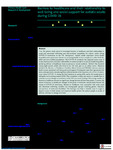Barriers to healthcare and their relationship to well-being and social support for autistic adults during COVID-19
| dc.contributor.author | Featherstone, Charlotte | |
| dc.contributor.author | Sharpe, RA | |
| dc.contributor.author | Axford, Nick | |
| dc.contributor.author | Asthana, Sheena | |
| dc.contributor.author | Ball, S | |
| dc.contributor.author | Husk, Kerryn | |
| dc.date.accessioned | 2022-12-14T11:33:26Z | |
| dc.date.available | 2022-12-14T11:33:26Z | |
| dc.date.issued | 2022-12-14 | |
| dc.identifier.issn | 1463-4236 | |
| dc.identifier.issn | 1477-1128 | |
| dc.identifier.other | e79 | |
| dc.identifier.uri | http://hdl.handle.net/10026.1/20078 | |
| dc.description.abstract |
Aim: The present study aimed to investigate barriers to healthcare and their relationships to social and emotional well-being and intersectional inequalities for autistic adults during COVID-19 restrictions in the UK. Background: Autistic adults experience severe health inequalities and report more barriers to accessing health services compared to other both disabled and non-disabled populations. The COVID-19 pandemic has impacted many areas of society that may have increased vulnerability of autistic people to social and health inequalities, including delivery of healthcare from in-person to remote methods. Method: One hundred twenty-eight autistic adults who lived in the UK took part in an online survey. Measures included the Barriers to Healthcare Checklist (Short Form) and PROMIS outcome measure bank to assess emotional well-being and social support. Participants rated their agreement with items, retrospectively considering three different points of the trajectory of COVID-19 restrictions: before COVID-19, during the first lockdown in spring 2020, and in the month prior to taking the survey during autumn 2020. They completed a follow-up survey six months later to continue to assess change as restrictions in the UK were eased. Findings: The average number of barriers to healthcare showed no significant change between all four time points. However, the nature of barriers to healthcare changed at the point of lockdown and persisted beyond the easing of COVID-19 restrictions. Barriers to healthcare were associated with some social and emotional well-being variables and demographic groups including gender, education and presence of additional disabilities. The findings may help to identify areas to target to improve access to both remote and in-person health systems for autistic people as modes of delivery continue to change over time. | |
| dc.format.extent | e79-e79 | |
| dc.format.medium | Electronic | |
| dc.language | en | |
| dc.language.iso | en | |
| dc.publisher | Cambridge University Press | |
| dc.subject | Access to Healthcare | |
| dc.subject | Autism | |
| dc.subject | autistic adults | |
| dc.subject | COVID-19 | |
| dc.subject | emotional well-being | |
| dc.subject | health services delivery | |
| dc.title | Barriers to healthcare and their relationship to well-being and social support for autistic adults during COVID-19 | |
| dc.type | journal-article | |
| dc.type | JOUR | |
| plymouth.author-url | https://www.cambridge.org/core/article/barriers-to-healthcare-and-their-relationship-to-wellbeing-and-social-support-for-autistic-adults-during-covid19/28DED84EBC7AA5115E5E31DE34513D2D | |
| plymouth.volume | 23 | |
| plymouth.publication-status | Published | |
| plymouth.journal | Primary Health Care Research & Development | |
| dc.identifier.doi | 10.1017/S1463423622000755 | |
| plymouth.organisational-group | /Plymouth | |
| plymouth.organisational-group | /Plymouth/Faculty of Health | |
| plymouth.organisational-group | /Plymouth/Faculty of Health/Peninsula Medical School | |
| plymouth.organisational-group | /Plymouth/REF 2021 Researchers by UoA | |
| plymouth.organisational-group | /Plymouth/REF 2021 Researchers by UoA/UoA20 Social Work and Social Policy | |
| plymouth.organisational-group | /Plymouth/Research Groups | |
| plymouth.organisational-group | /Plymouth/Research Groups/FoH - Community and Primary Care | |
| plymouth.organisational-group | /Plymouth/Research Groups/Institute of Health and Community | |
| plymouth.organisational-group | /Plymouth/Research Groups/Plymouth Institute of Health and Care Research (PIHR) | |
| plymouth.organisational-group | /Plymouth/Users by role | |
| plymouth.organisational-group | /Plymouth/Users by role/Academics | |
| plymouth.organisational-group | /Plymouth/Users by role/Researchers in ResearchFish submission | |
| dc.publisher.place | England | |
| dcterms.dateAccepted | 2022-11-12 | |
| dc.rights.embargodate | 2022-12-20 | |
| dc.identifier.eissn | 1477-1128 | |
| rioxxterms.versionofrecord | 10.1017/S1463423622000755 | |
| rioxxterms.licenseref.uri | http://www.rioxx.net/licenses/all-rights-reserved | |
| rioxxterms.type | Journal Article/Review |


